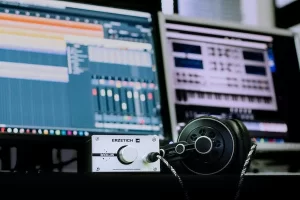Music is one of the oldest forms of therapy and is an incredibly powerful tool for healing. Music therapy can be used in many different ways to promote emotional, mental, and physical health and wellbeing. Christian music therapy is the use of Christian hymns and spiritual music to evoke a response from people and encourage them to heal from both mental and physical illness.
Music is a powerful medium for expressing our feelings, thoughts, and beliefs. Christian music therapy uses this power of music to evoke a response from the listener and promote healing. A Christian music therapist utilizes sacred hymns and spiritual songs to promote emotional, mental, and physical healing.

The use of Christian music therapy can also help a person resolve difficult issues in life or find a place of hope and comfort. Through the word of God in music, a person may be able to come to terms with their struggles and find strength to move forward. In the Bible, we have a great example of how music can be used to bring healing to an individual. In Psalm 40:3, we read, “He put a new song in my mouth, a hymn of praise to our God.” This scripture reminds us that when we use music as a tool for healing, it can help us to find a new song of hope and peace in our lives.
Christian music therapy has been used to treat a variety of mental and physical conditions. It has been used to help treat depression, anxiety, trauma, and physical pain. Music with religious content can provide comfort and can be used to help a person get in touch with their faith. As the Bible says in Psalm 147:3, “He heals the brokenhearted and binds up their wounds.”
Listening or participating in a Christian music therapy session can be incredibly beneficial in terms of helping a person gain emotional, mental, and physical healing. Music therapists may employ a variety of techniques such as rhythm, singing, chanting, or playing instruments including keyboards, guitars, and drums. Depending on the needs of the individual, the music therapist will select the type of music and activities that will best meet the need of the person.
When we think of Christian music therapy, we often think of it as a type of performance therapy, but this is only part of it. Music therapy is also used in combination with verbal counseling as a form of psycho-emotional therapy. A Christian music therapist is trained to recognize emotional triggers and provide guidance through the use of music. The music can provide comfort, peace, and enlightenment, and the verbal guidance provided can further help the individual to gain insight into their lives.
Christian music therapy is an incredibly powerful tool for healing. Through the use of sacred hymns and spiritual songs, a Christian music therapist can help a person gain emotional, mental, and physical healing. Music can help an individual become more in tune with their faith, and the use of religious songs provide hope and comfort in times of stress and difficulty. If you are looking for a form of therapy that offers hope and healing, Christian music therapy may be the right choice for you.





 I love music. It’s a big part of my daily life. My friends often say that my signature look isn’t complete without earbuds hanging from my ears. Reaching for my iPod Classic isn’t a decision, it’s a reflex. I once left the house without headphones and it was a big deal. With such a significant portion of my day spent doing low mental capacity tasks- driving, editing spreadsheets cooking, It’s either talk to myself and make my loved ones worried, or listen to music. So I find myself spending a lot of time thinking about what’s going into my ears!
I love music. It’s a big part of my daily life. My friends often say that my signature look isn’t complete without earbuds hanging from my ears. Reaching for my iPod Classic isn’t a decision, it’s a reflex. I once left the house without headphones and it was a big deal. With such a significant portion of my day spent doing low mental capacity tasks- driving, editing spreadsheets cooking, It’s either talk to myself and make my loved ones worried, or listen to music. So I find myself spending a lot of time thinking about what’s going into my ears! One of my fondest memories of growing up was our yearly church choir. I attended a small church, and the leaders decided against a regular church choir, opting for a small worship team instead. Twice during the year, however, all the musically inclined in the congregation would stay after morning service and practice for our biannual Christmas and Easter choir. We sang classics- The Messiah, Christmas carols- and more modern pieces, and once a year, on the holidays themselves (or nearest Sunday) after singing a few hymns with the rest of the congregation, the choir would filter up to the front of the church and Mr. Jenning, our choir director would start us off.
One of my fondest memories of growing up was our yearly church choir. I attended a small church, and the leaders decided against a regular church choir, opting for a small worship team instead. Twice during the year, however, all the musically inclined in the congregation would stay after morning service and practice for our biannual Christmas and Easter choir. We sang classics- The Messiah, Christmas carols- and more modern pieces, and once a year, on the holidays themselves (or nearest Sunday) after singing a few hymns with the rest of the congregation, the choir would filter up to the front of the church and Mr. Jenning, our choir director would start us off. Has there ever been a time where Music has been there for you? Often we find ourselves in situations where it doesn’t feel like we can talk to anyone. Maybe we believe we’ve let our loved ones down, or that if we confess to our elders that maybe we will be judged. Whatever is holding you back, I often find myself in plights exactly like these, where I have something weighing on my shoulders and I can’t think past my own insecurities to give it to God. In those
Has there ever been a time where Music has been there for you? Often we find ourselves in situations where it doesn’t feel like we can talk to anyone. Maybe we believe we’ve let our loved ones down, or that if we confess to our elders that maybe we will be judged. Whatever is holding you back, I often find myself in plights exactly like these, where I have something weighing on my shoulders and I can’t think past my own insecurities to give it to God. In those